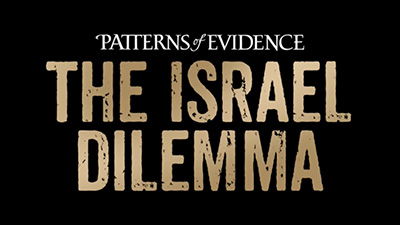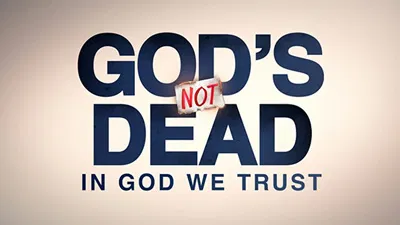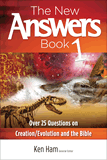
An Examination of Christian Entertainment Choices and the Movie Noah
To See, or Not to See
Should Christians support certain movies? This article uses the Noah movie as a framework to discuss the issue of attending movies with Christian themes and biblical storylines.
[Spoiler alert: This short review reveals certain elements of the plot of the movie Noah, but only to the extent necessary to convey the concerns with the film. This prerelease review is based on information from a variety of sources including statements from several people who have screened the film and posted articles on various websites as well as information from an Answers in Genesis staff member who saw the full film in rough-cut form in November 2013. I have done my best to represent the film accurately based on that information. If there are any inaccuracies revealed once the film is released, I will gladly correct those points as an addendum to this article. AiG will be publishing an initial short review on March 28 and a full review as soon as possible.]
Of late, there has been much discussion about whether Christians should be supporting certain movies. These movies have come in various formats and have had different levels of biblical accuracy. Some are fictional accounts depicting the lives of Christians while others are supposed to portray biblical accounts on the big screen.
My hope with this article is to use the Noah movie as a framework to discuss the issue of attending movies with Christian themes and biblical storylines. I hope you can take the principles discussed here and apply them to other situations. For instance, there is a movie depicting the Exodus coming out in the future, as well as others that are sure to come. I have no intent of telling you what to do or think or tell you that you will lose your salvation if you see this or that movie. Rather, I ask you to think through the lens of Scripture and seek to take every thought captive to the obedience of Christ in line with your own conscience toward these issues.
To be clear, I intend to see the Noah movie with several colleagues when it comes out, but not for entertainment. I personally believe it is wrong to seek entertainment from media that promotes blasphemy (misrepresentations of God and His Word or His representatives1) or celebrates those sins that my Savior died for (e.g., vulgar language, fornication, immodesty, crude humor, and so on). But there are those within the body of Christ who work to help others understand certain issues and exercise discernment. I understand that as one of my roles as an elder at my local church and within my role at Answers in Genesis. I also depend on others to help me make wise and Christ-glorifying choices when it comes to books, movies, and the like. With that said, I don’t think it is wise for every Christian to rush out to see this film or others that will appear in the future. I am not being hypocritical; I am calling for us, as a body, to exercise wisdom. I ask you to consider my case for that below.
Noah: A Study
In a recent article published online at the Christian Post, John Snowden, the biblical advisor for the movie, tells people of faith that they can embrace the new Noah movie. I would like to examine a few of his claims and call Christians to carefully consider whether this movie is worth supporting. Others have added their voice to the discussion, and I will include links to some of those within the article.
Opening Mistakes
To intentionally distort God’s Word and misrepresent what the Bible clearly teaches is blasphemy.
Snowden opens his article by claiming, “Unfortunately, those who have felt compelled to criticize the film in these stories haven’t actually seen it – so it’s difficult to understand what exactly they’re criticizing. I have seen Noah – in fact, I’ve been working on it for the last two years as the filmmakers’ biblical adviser.”2 Well, this censure is not true in the case of the criticism coming from Answers in Genesis. In November of 2013, a staff member and others saw the film in a rough-cut form3 and in February 2014 other members of the staff attended a discussion at the National Religious Broadcasters convention where Mr. Snowden discussed these issues. The criticisms posted on this site have been based off of that viewing and the discussion rather than blind speculation. Even the Christians posting on our Facebook pages with respect to the film—presumably our supporters—have been repeatedly levelling the charge that we shouldn’t condemn a movie we have not seen. This is not true and just shows that, ironically, the people criticizing us for criticizing the film have not actually read what we have written about it.
Mr. Snowden also claims that “Scripture is overtly quoted by many characters in Noah. God’s words from the Bible are unmistakably a part of this film. The film is pro-God.” So I want to address that point in this article to see if that really is the case. To intentionally distort God’s Word and misrepresent what the Bible clearly teaches is blasphemy. To make a film filled with blasphemous distortions is not pro-God.
To further validate this point, Darren Aronofsky, the film’s producer, told a friend that Noah is “the least biblical biblical film ever made,”4 and another source that “the film is completely honouring the text.”5 It seems that the “story” is what matters rather than being faithful to what God has revealed.
The Claims
After claiming that the movie sticks closer to the text of the Bible than many have suggested, Mr. Snowden supports that claim by saying, among other things, “No extra people survive the flood who shouldn’t. There’s a dove and a rainbow, two of each animal . . . .” But who survives in the movie? Noah, his wife, his three sons, and one daughter-in-law. That is not close to the text; that is an error that leads those watching the film to believe that the Bible teaches that one couple repopulated the planet rather than trusting what Scripture teaches in Genesis 9–11. It also rejects the clear New Testament teaching that eight souls were saved (2 Peter 2:5). Further, it is clear from the trailer and the rough cut6 that more than two of each kind of animal was saved on the Ark. Several who have seen the film refer to the animals as being “crammed” into the Ark. This is a distortion of the text and will likely serve to reinforce the idea promoted by scoffers that there was not enough room on the Ark for all of the animals.
Snowden promotes Noah seeking wisdom from an elder as a positive: “In a postmodern world that says never to trust someone over 30, this story has Noah seeking out his loving, wise (and scriptural) grandfather Methuselah to help interpret the vision he is getting from God and how to act upon it. Methuselah also gives the key scriptural explanation for why God is bringing the flood. Listen for it.” The only problem is that the Methuselah character “is a type of witch-doctor, whose mental health is questionable,” according to the viewing of the rough cut. A witch doctor giving key scriptural explanations is blasphemous and will only promote a misunderstanding of the character of God in the mind of the viewer who is not aware of God’s true character revealed in Scripture.
Under the heading “Noah Stands Strong for Justice,” Snowden states, “An overly gushy Hollywood Noah might be tempted to let a flock of ‘nice’ or ‘good’ humans on the boat, or three or four extra cute giraffes that he felt bad for. But this Noah stands strong. His mission is clear: Nobody but his family survives.”
So the Noah character in the film only cares about saving his family and the “innocents”—the animals. This is an incredible way to interpret the Bible, especially when we know from 2 Peter 2:5 that the biblical Noah was a preacher of righteousness. What is the point of preaching? To call people to repentance. Why would Noah be preaching of righteousness found in the grace of God (Genesis 6:8) if he only cared about his family and the animals? Misrepresenting one of God’s faithful servants (Hebrews 11:7) this way makes an absolute mockery of God’s perfect Word. It disconnects the New Testament from the Old Testament, a violation of sound biblical interpretation. Preachers don’t point people away from salvation.
Additionally, the film portrays Noah as a harsh and sinful man. There is no doubt that the real Noah was a sinner (he was a descendant of Adam), but God describes Noah with these words: “This is the genealogy of Noah. Noah was a just man, perfect in his generations. Noah walked with God
” (Genesis 6:9). From the rough cut preview, a different picture of the Noah character is on display:
Noah at first is portrayed as a humble yet strong good man—a father and husband who protected his family from the evil that had come upon the world. But as he helped build the Ark, he was portrayed more like a basket-case who was convinced that his family was the last generation. He repeated over and over again that God would not let them repopulate since God would replant Eden without man and perfection would be reestablished with the “innocent animals” God brought on the Ark. Even when Noah’s eldest son brought news to the family on the Ark that his wife was expecting, the movie’s Noah said, essentially, “If it is a male, he shall live. If a girl, I will kill her because it is not God’s will for man to repopulate.”
Another distortion is presented in the movie in that Noah does not clearly understand God’s message to him. This stands in direct contradiction to the text of Genesis 6–7 where God clearly and directly communicates to Noah. It wasn’t a series of dream puzzles Noah had to decipher. Snowden presents this extrabiblical struggle within the Noah character. “It’s healthy that Noah struggles to understand precisely what God is saying, but, regardless, Noah trusts and acts faithfully. The struggle is not always easy to watch, particularly in the later parts of the film, but the values that come out of this narrative are special.” As a human, Noah likely had moments of doubt, but God spoke clearly to Noah. To suggest otherwise is to misrepresent the Word of God. To suggest otherwise is to claim that God kept Noah in the dark without clearly communicating with him. That is a misrepresentation of God’s character as revealed to us in the Bible.
Additionally, the animals on the earth were not innocent:
The earth also was corrupt before God, and the earth was filled with violence. So God looked upon the earth, and indeed it was corrupt; for all flesh had corrupted their way on the earth. And God said to Noah, “The end of all flesh has come before Me, for the earth is filled with violence through them; and behold, I will destroy them with the earth.” (Genesis 6:11–13)
All flesh faced God’s judgment as an extension of the Curse that had impacted the animals as well as humanity.
God’s intention in bringing the animals onto the Ark was to save them to repopulate the earth (Genesis 8:17). The rough cut of the film depicts a man confounding God’s plan: “A wounded Tubal-Cain axes his way inside the Ark in only about ten minutes and then hides inside. . . . Tubal-Cain stays alive by eating hibernating lizards.” As unclean animals, the lizards would have been represented by one pair. By eating the lizards, he thwarted God’s plan to keep those lizards alive to repopulate the earth. This represents God as a bumbler who can’t bring His plans to pass. This may sound like a petty point, but it is exactly these types of things that scoffers use to mock the Bible and God, suggesting that Noah or the tigers would have been craving a steak and made a meal of another creature on board. But the Bible reveals that men and animals were supposed to be eating a vegetarian diet, and only after the Flood did God authorize the eating of meat (Genesis 1:29–31; 9:3–4).
Snowden also indicates in his appeal that the film portrays God’s supernatural intervention. “An active God with a plan will often move in power to make miracles happen. Our God makes known the end from the beginning; His purposes will stand and He will do all that He pleases, including healing the physically broken to bring about His plan.” This is apparently in reference to this description (from the viewing of the rough cut) of a girl being healed of a wound, though not in a supernatural way that gives glory to God:
For example, the main characters of the movie are Noah, his wife, and three sons—and one little girl they rescued after all in her family were murdered by an evil tribe. She was badly injured when they found her, but Noah’s wife placed healing nectar on her stomach and she later grew up to become the eldest son’s wife. For the longest time she was barren in the womb until Noah’s wife convinced Methuselah to bless her womb—against Noah’s wishes.
There are other elements of the film that are presented as magical or fanciful. This also undermines the authority of Scripture, making the account depend on a Noah with a superpower bracelet and giant rock creatures who are nowhere in the text. On top of that, the creation of animals is described by Noah as an evolutionary process, not special creation by God and the environmentalist overtones are loud if not thundering.7
A Gospel Springboard
Snowden suggests that at “a time when pop culture conversations tend to focus on entertainment spotlighting superheroes, vampires and zombies, the whole country is abuzz about a story that embraces the themes of Scripture.” But it still distorts God’s Word. It may embrace a biblical theme, but does it embrace truth about the God who inspired the Bible?
Snowden closes with:
If you’re concerned a nonbeliever is going to learn the details of the story wrong, I’d encourage you to reread the list above and start to have beautiful conversations about faith over some popcorn and soda in nonthreatening ways with people you may have never otherwise had the chance. The Gospel alone is good news enough with or without a movie, but when theological questions begin to emerge from inside any person, I would far rather have you and I listening instead of criticizing. Remember, it is the church’s responsibility to spread the Gospel – not Hollywood’s. That Noah tees up a deeper conversation about God and his plan of salvation for us is a considerable blessing.
I agree that this movie will open opportunities to engage people in conversations, but this doesn’t mean every Christian has to watch the movie to have a conversation. I doubt Mr. Snowden would be encouraging people to watch a movie that maligned his mother the way this film does the truth of the Bible and God’s character—even if it had a disclaimer in the introduction. We can engage people in conversations by asking them what they learned about Noah, or God, or other aspects of the film and listening to them. But because of the very unbiblical nature of the story, there will have to be criticism—errors will have to be pointed out or truth cannot be revealed. Truth is always critical of falsehood.
By asking good questions, we can draw out the ideas presented in the movie and then invite people to sit down with us and an open Bible. We can read to them the inspired words of the Scripture we cherish and direct them to the magnificent grace of God displayed throughout Scripture, but ultimately in the life, death, and resurrection of Jesus Christ on behalf of sinners.
Many Christians suggest that if they have not seen the movie, they will not be able to talk with credibility with an unbeliever. That is a false argument—you would not say the same thing about watching pornography, getting drunk, or other ungodly acts in order to talk credibly about them. In each of those cases all you have to do is compare those things with the truth from God’s Word. You don’t have to experience drunkenness to be able to talk with a drunkard about truth. The same is true with any film—whether it is based on the Bible or not. Don’t buy into this false line of reasoning if you are convicted that a film is unworthy of viewing. You can make this initial decision by reading a review of the film from someone you trust who has chosen to see the movie and use those elements to discuss it with others. Also, don’t judge your brothers and sisters who choose to see films that you find objectionable based on conscience issues that are not clear issues of sin (Romans 14:5–13).
In fact, responding to someone who asks you if you have seen the movie with, “I have decided not to watch it because I heard from a trustworthy source that it misrepresents Scripture and the God I love dearly,” could be a powerful testimony to them. Tell them, with grace and truth, you chose to stand on your convictions and avoid something you saw as blasphemous. Tell them you love your God more than entertainment. That is a radical testimony in our culture.
Ask them what the purpose of the Ark was in the film. Ask them what Noah was like. Ask them to tell you and then open the source of truth and hope with them to teach them what God really said and what He is really like. Tell them that He has made a way for them to be forgiven of their sins, just like Noah was—by trusting in the Savior for forgiveness.
Themes or Truth
A pattern is clear in the article—Mr. Snowden is more concerned about the “themes” of Scripture being portrayed than its truthfulness. There are surely themes in the Bible, but those themes are grounded in truth. That truth is grounded in God’s character. This film presents a God who does not accomplish what the Bible clearly says He set out to do or who can communicate clearly with His children. It presents a Noah, not as a righteous, just, and faithful man who is perfect in his generation, but as an angry, disturbed man who has a mind to murder his granddaughter to wipe out the future of mankind.
“People of faith” may be able to embrace this movie, but I sincerely ask you to consider if a Christian who trusts in the inspired, infallible, inerrant, and sufficient Word of God can embrace it. Many professing Christians don’t believe that Noah was a real person from whom we all descended. Many believe that the Flood was simply a regional event. Others believe the Flood is simply allegory that communicates a certain theme that we are to embrace. I pray that we will all stand for the authority of God’s Word and seek to defend His honor at all costs, even at the expense of our own entertainment.
Paramount Pictures wants your money, and they want you to believe, as a disclaimer added to promotional material states, that Noah “is inspired by the story of Noah. While artistic license has been taken, we believe that this film is true to the essence, values and integrity of a story that is a cornerstone of faith for millions of people worldwide. The biblical story of Noah can be found in the book of Genesis.”8 I will leave it up to you to decide if they are telling the truth, or a story. Before you buy that ticket, for this or any movie, read Ephesians 4:17–5:21 and ask for wisdom from the Holy Spirit that you may walk in obedience to your Lord, Jesus Christ.
Footnotes
- The Tyndale Bible Dictionary includes this explanation under “blasphemy”: “The most common form of blasphemy in the New Testament is blasphemy against God. One might insult God directly (Revelation 13:6; 16:9), mock his word (Titus 2:5), or reject his revelation and its bearer (Acts 6:11)” (Tyndale Bible Dictionary, Logos Version 2001, s.v. “Blasphemy”).
- John Snowden, “Why People of Faith Can Embrace the ‘Noah’ Movie,” Christian Post, February 26, 2014, http://www.christianpost.com/news/why-people-of-faith-can-embrace-the-noah-movie-115276/.
- For the review of the rough cut, see Ken Ham, “Don’t Be Taken in by the Noah Movie’s Promotion,” Around the World with Ken Ham, http://blogs.answersingenesis.org/blogs/ken-ham/2013/11/19/dont-be-taken-in-by-the-noah-movies-promotion/. While it is possible that some minor changes have been made since the rough cut was shown in November, it is impossible that all of these anti-biblical elements have been removed since they are central to the storyline of the film.
- “Darren Aronofsky Gets Biblical,” The New Yorker, March 10, 2014, http://www.newyorker.com/services/presscenter/2014/03/17/140317pr_press_release.
- “Darren Aronofsky: Noah is the perfect film to bring believers and non-believers together,” Christianity Today, March 11, 2014, http://www.christiantoday.com/article/darren.aronofsky.noah.is.the.perfect.film.to.bring.believers.and.non.believers.together/36169.htm.
- From the rough cut of the film, “it appears as if every species was crammed in the Ark instead of just the kinds of animals, thus mocking the Ark account the same way secularists do today.”
- Ed Stetzer, “Noah: Five Negative Features about the Film,” Christianity Today, March 3, 2014, http://www.christianitytoday.com/edstetzer/2014/february/noah-five-negative-features-about-this-film.html.
- Kim Masters, Aaron Couch, “‘Noah’ Marketing Tweaked at Urging of Religious Group (Exclusive),” The Hollywood Reporter, http://www.hollywoodreporter.com/news/noah-marketing-tweaked-at-urging-684305.
Recommended Resources

Answers in Genesis is an apologetics ministry, dedicated to helping Christians defend their faith and proclaim the good news of Jesus Christ.
- Customer Service 800.778.3390
- Available Monday–Friday | 9 AM–5 PM ET
- © 2026 Answers in Genesis





